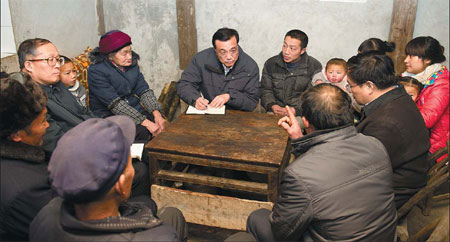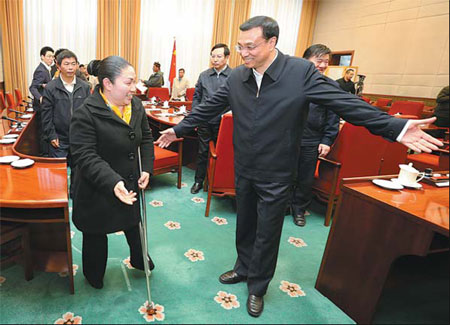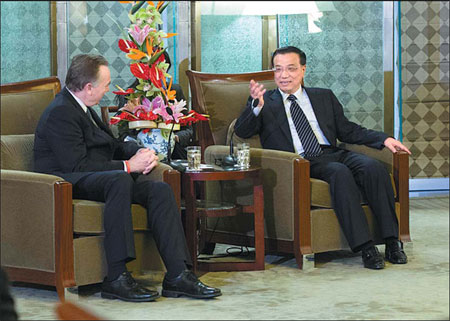Premier sets sights on economic growth
Updated: 2013-03-18 07:54
By Xinhua (China Daily)
|
|||||||||||
Profile | Li Keqiang
|
On Dec 29, Li Keqiang talks with villagers in the Qingbao village of Longfeng township, Enshi Tujia and Miao autonomous prefecture, Central China's Hubei province. Huang Jingwen / Xinhua |
|
On Jan 5, Li asks Zhou Yuehua (left), a rural doctor from a village in Chongqing, to go before him after his meeting with Zhou and 17 other model rural doctors in Beijing. Yao Dawei / Xinhua |
|
On Dec 12, Li meets with foreign guests attending the 2012 Annual General Meeting of China Council for International Cooperation on Environment and Development in Beijing. Wang Ye / Xinhua |
Leader gets credit for streamlining the Cabinet
Li Keqiang, 57, was appointed Chinese premier on Friday. He takes on the role at a time when China is the world's second-largest economy. He is the first premier born after the founding of the People's Republic of China in 1949 and holds dual academic degrees in economics and law.
During his five-year tenure as vice-premier, Li was widely acclaimed for his acumen and determination in facing challenges, and his professionalism. He made remarkable achievements in overcoming difficulties, and he sought to accelerate the economy, improve people's livelihoods and deepen reforms.
Three decades of rapid development have made China a middle-income country. However, the nation is still on a difficult journey with many obstacles ahead. Building a moderately prosperous society by 2020 in a country with a population of over 1.3 billion will be an epic and historic task.
Upon his appointment as premier, Li bowed deeply and smiled as he received the applause of some 2,900 legislators in the Great Hall of the People, underscoring his sense of duty as the premier of a big country and conveying the wisdom and strong-mindedness of a mature statesman.
Reform
Market-oriented reform has long been on Li's political agenda. During his investigative tour to Baotou of the Inner Mongolia autonomous region in February, Li stressed "the hand of the market, the government and the people should join together" to unleash the power of the reform.
Li chaired a seminar on reform six days after the conclusion of the 18th National Congress of the Communist Party of China in November.
At the seminar, Li put forward the "reform as dividends" theory. "Reform at present has entered deep water and has to sail in a head wind. We may avoid mistakes if we make no endeavor, but we must bear a historical responsibility," he said.
As China's national strength continues to build, the endeavor to face up to conflicts and difficulties ahead and advance reform reflects an ingrained awareness in the Chinese people of being prepared for potential dangers and the CPC's sense of mission.
Administrative reform became a top priority after the 18th CPC National Congress. The second plenary session of the 18th CPC Central Committee in February endorsed a plan for the institutional reform and functional transformation of the State Council, which was adopted by the National People's Congress on Thursday. It was Li who led the drafting team.
Li insisted on cutting cabinet departments down to 25 to be more efficient. This round of cabinet restructuring is the seventh to take place in China since the country's reform and opening-up in the late 1970s. Like any reform, this round represents a difficult challenge.
A commentary published in Nouvelles d'Europe, a Chinese-language newspaper in Europe, said China's institutional restructuring will advance step by step, adding that it is high time for China's new leaders to translate their political courage and intellect into political decision-making.
In mapping out the plan, Li said administrative reform is not merely a reduction in the size of the cabinet, but a reform that prioritizes the transformation of functions. He called for decentralizing power over the market, society and local authorities by decreasing government intervention. Functional transformation is integrated with institutional restructuring in his proposal.
Today's Top News
Police continue manhunt for 2nd bombing suspect
H7N9 flu transmission studied
8% growth predicted for Q2
Nuke reactor gets foreign contract
First couple on Time's list of most influential
'Green' awareness levels drop in Beijing
Palace Museum spruces up
Trading channels 'need to broaden'
Hot Topics
Lunar probe , China growth forecasts, Emission rules get tougher, China seen through 'colored lens', International board,
Editor's Picks

|

|

|

|

|

|








